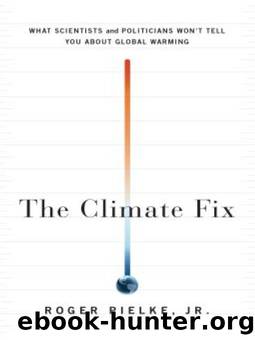The Climate Fix: What Scientists and Politicians Won't Tell You About Global Warming by Roger Pielke

Author:Roger Pielke
Language: eng
Format: azw3
Publisher: Basic Books
Published: 2010-09-27T22:00:00+00:00
CHAPTER 6
How Climate Policy Went Off Course and the First Steps Back in the Right Direction
MUCH AS THERE IS a qualitative disagreement about what the response to climate change ought to beâsuch as whether it should be a comprehensive policy aimed at a large-scale restructuring of society or focused on technological policies aimed at addressing a discrete set of problems that society faces or aspects of bothâthere is an even more fundamental disagreement about what climate change itself is. This isnât just a question of skeptics versus the convinced. Believe it or not, the main scientific and policy institutions responsible for climate change in the international arena do not even agree on what the phrase âclimate changeâ actually means. For example, if you take a look at the âSummary for Policy Makersâ of the 2007 IPCC science working group, youâll find this, in its first footnote: âClimate change in IPCC usage refers to any change in climate over time, whether due to natural variability or as a result of human activity. This usage differs from that in the United Nations Framework Convention on Climate Change, where climate change refers to a change of climate that is attributed directly or indirectly to human activity that alters the composition of the global atmosphere and that is in addition to natural climate variability observed over comparable time periods.â1
The policy community thus has a very narrow definition of climate change, which in essence refers to the effects of the emission of greenhouse gases due to human activity on climate, when those effects exceed the bounds of natural climate variability. By contrast, the IPCC defines climate change much more broadly; for them, it means a change in the statistics of climate over a period of thirty to fifty years (or longer) beyond natural variability, irrespective of the cause of the change. Those two competing definitions have led directly to pathological policies, biased and politicized science, and a climate policy architecture that is, at its core, scientifically and practically unsound. Understanding the consequences of having two different definitions of climate change in useâdefinitions that have coexisted in the climate debate for at least twenty yearsâlies at the heart of understanding why climate policy has been off course from the start, and the steps needed to get back on track.
Consider the following thought experiment. Letâs start with the real world, in which the human consumption of fossil fuels leads to emissions of greenhouse gases, which lead to changes in the climate, which in turn result in undesirable effects on people and the environment. Letâs call this Greenhouse World. Now imagine an alternative world. In this alternative world everything is exactly as it is in Greenhouse World, but with one important difference. In this world, instead of the human use of fossil fuels leading to changes in climate, the source of change is instead a small strengthening of the intensity of the Sun. Letâs call this world Bright Sun World. The changes in climate and effects on people
Download
This site does not store any files on its server. We only index and link to content provided by other sites. Please contact the content providers to delete copyright contents if any and email us, we'll remove relevant links or contents immediately.
Sapiens: A Brief History of Humankind by Yuval Noah Harari(14346)
Sapiens by Yuval Noah Harari(5346)
Pale Blue Dot by Carl Sagan(4984)
Homo Deus: A Brief History of Tomorrow by Yuval Noah Harari(4890)
Livewired by David Eagleman(3754)
Origin Story: A Big History of Everything by David Christian(3678)
Brief Answers to the Big Questions by Stephen Hawking(3411)
Inferior by Angela Saini(3300)
Origin Story by David Christian(3185)
Signature in the Cell: DNA and the Evidence for Intelligent Design by Stephen C. Meyer(3117)
The Gene: An Intimate History by Siddhartha Mukherjee(3085)
The Evolution of Beauty by Richard O. Prum(2972)
Aliens by Jim Al-Khalili(2814)
How The Mind Works by Steven Pinker(2804)
A Short History of Nearly Everything by Bryson Bill(2675)
Sex at Dawn: The Prehistoric Origins of Modern Sexuality by Ryan Christopher(2508)
From Bacteria to Bach and Back by Daniel C. Dennett(2470)
Endless Forms Most Beautiful by Sean B. Carroll(2465)
Who We Are and How We Got Here by David Reich(2423)
